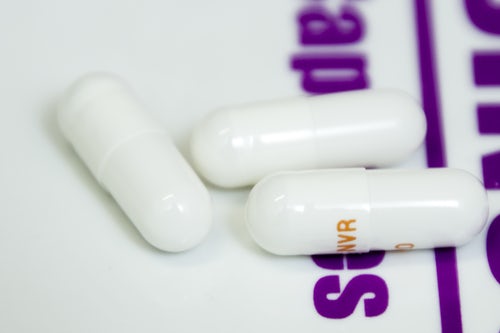Is There a Connection Between Body Weight and Drug and Alcohol Consumption?

According to the American Psychiatric Association, substance abuse is the excessive use of alcohol or drugs that may make an individual experience clinical impairments and dramatic losses in social, professional, and academic skills. Substance abuse may also alter the diet, resulting in irregular eating patterns or poor nutrition. Use of substances such as drugs and alcohol may lead to significant health problems often associated with weight gain or loss.
Table of Contents
Substance Abuse and Metabolism
During the process of digestion, the body breaks down the food you eat and uses the food for energy and nutrients. The cells in the body must have adequate amounts of nutrients to function properly and aid in metabolism. Body cells also need sugar in the form of glucose for growth and energy and to repair any damage that occurs.
When people abuse substances, the abuse often leads to poor diet and nutrition because drug and alcohol abuse may
-
Suppress their appetites or make them more hungry than usual.
-
Lead them to crave unhealthy foods, especially low-nutrient foods or foods full of sugar.
-
Make them lethargic and unable to obtain or prepare food.
-
Alter their minds or give them so much energy that they forget to eat.
-
Hurt their finances, so they may feel forced to choose between buying food or buying drugs or alcohol.
Poor diet and nutrition may produce symptoms such as hunger or dizziness in the short term. In the long term, nutritional deficiences and poor diets may lead to damage of the brain and other organs as well as other conditions.
Excessive amounts of alcohol are particularly harmful to our bodies. Usually, the body does not store alcohol. When you consume alcohol, your body breaks it down before it excretes it. But alcohol does not have nutrients. It has empty calories that make individuals feel as if they are full and satisfied, particularly when they consume large amounts of alcohol.
Drinking large quantities of alcohol damages the intestinal tract, harming the ability of the body to absorb and use minerals, vitamins, and other nutrients. High levels of alcohol in a person’s blood may slow down bodily processes such as digestion. Excessive alcohol may reduce the release of minerals, sugars, vitamins, and amino acids from the food an individual eats. Alcohol prevents the body from receiving the nutrients it needs to function optimally.
Alcohol and Liver Function
 When you consume alcohol, it speeds the rate of metabolism in the body because the liver needs to work harder to break down alcohol and excrete it from the body. When the liver is busy breaking down and excreting alcohol, it has more trouble breaking down carbohydrates and releasing nutrients such as glucose that are needed for cell growth and functioning.
When you consume alcohol, it speeds the rate of metabolism in the body because the liver needs to work harder to break down alcohol and excrete it from the body. When the liver is busy breaking down and excreting alcohol, it has more trouble breaking down carbohydrates and releasing nutrients such as glucose that are needed for cell growth and functioning.
In addition, the liver stores excess glucose (sugar) in form of fat, which is used to provide energy for the body. If the liver is concentrating on processing large amounts of alcohol, it fails to release the glucose it has stored. The glucose stored in body fat may start swelling and causing havoc.
Fat cells building in the liver may produce a condition known as alcoholic steatohepatitis. During the early stages, alcoholic steatohepatitis may be asymptomatic, which means it does not produce any symptoms. When symptoms begin to occur, they may take the form of fever, vomiting, nausea, and loss of appetite. These flu-like symptoms signify that the liver damage is in its late stages.
When doctors detect increased levels of bilirubin and other liver enzymes in the blood, they check people for liver damage and conditions such as steatohepatitis. A person who has liver damage may experience symptoms such as loss of appetite, jaundice or yellowing of the skin, and extreme fatigue. Loss of appetite caused by liver damage may make a person lose weight, which may pose further risks to his or her health.
Health and Body Weight
Although modern culture seems to be obsessed with body weight, there is such a thing as too thin. Excessive alcohol and drug use may lead to excessive weight loss, which may lead to a host of problems:
-
Physical weakness. If we are less strong, we may be less likely to be active, so our hearts, brains, and other organs will receive less oxygen and not experience the other benefits of physical activity.
-
Mental weakness. If our brains do not receive oxygen, we do not have the internal resources to function as we should. Our impaired mental states may make it easier to continue abusing drugs and alcohol and harder to make other decisions.
-
Immune system weakness. If our immune systems are compromised, we may have problems fighting symptoms caused by drinking and drug use. We may be more likely to contract other conditions because our bodies cannot fight them.
-
Emotional weakness. If we are abusing alcohol or drugs, we may feel ashamed about our actions and develop anxiety and depression. Unfortunately, anxiety and depression may lead us to abuse even more drugs and alcohol, creating a cycle that may be difficult to escape.
Avoiding excessive amounts of alcohol and drugs may help people maintain a healthy weight and may thus prevent all types of weakness. Preventing weakness may promote overall health in the present and in the future.
Alcohol Abuse and Body Weight Changes
Consuming alcohol in excess or for a prolonged period of time not only impairs the ability of the body to extract nutrients and transport them to various parts of an individual’s body. It may also produce intestinal damage.
As the intestines are irritated, the digestive processes may slow down or stop entirely. Problems in the digestive process may produce a loss of appetite, intestinal blockage, and constipation. Experiencing these kinds of symptoms may cause a person to eat less, so they may begin to lose weight and become more weak. Weakness and weight loss may make their existing medical problems worse and may make it more difficult to fight other conditions.
Another hazardous habit is drinking alcohol on an empty stomach, which may present many health problems. People who drink without eating may have dangerously low levels of blood sugar. With time, a person who abuses alcohol may suffer from glucose intolerance and other diseases, such as type 2 diabetes, since the liver focuses more on processing and removing harmful substances or toxins that are produced by alcohol.
A person who misuses alcohol may also experience fluctuations in weight. When the stomach is empty you find that alcohol quickly leaves the stomach to reach the brain. If there is food in the person’s stomach, it slows down the rate at which alcohol leaves the stomach to reach the individual’s brain.
If individuals consume large amounts of alcohol, and there is food in their stomachs, alcohol may still reach the bloodstream and organs such as the liver and brain more quickly than the nutrients in food. It takes the liver about two hours to process and excrete one alcoholic beverage, such as a beer or glass of wine, for example.
When individuals consume alcohol in excess, their livers are only able to process a certain amount of alcohol in a particular amount of time. This means that in the interim, they will have high levels of potentially toxic substances affecting organs such as the brain, heart, and kidneys.
As people’s brains receive alcohol, the substance affects mental functions such as reasoning, judgment, speech, and vision. Experiencing these kinds of alcohol-produced side effects may cause people to forget to eat, eat less, eat inappropriate foods, or overeat. When you forget to eat food, you may lose weight and may become weak and susceptible to health conditions. When you overeat, you may gain weight and may be more susceptible to conditions such as obesity, diabetes, or even heart disease.
Drug Abuse and Weight Changes
Using recreational, prescription, or illegal drugs may result in substance abuse disorders. Different drugs affect an individual’s weight in different ways. Other behaviors are also related to using drugs and drinking. For example, smoking tobacco products is more common in people who abuse alcohol and drugs.

Like alcohol and drug abuse, cigarette smoking may create considerable health risks. Cigarette smoking reduces the circulation of blood to vital organs. It increases an individual’s risk of developing heart disease.
People who smoke heavily are often likely to lose their appetites because of the increased cravings for nicotine. Losing weight in this manner is not considered healthy because an individual may skip meals and decide to engage in smoking instead. Losing weight this way is not healthy because the body is not receiving adequate amounts of the minerals and vitamins it needs to function properly.
In some individuals, the effects of smoking may actually lead to weight gain, especially when they start smoking. This is because they may be inactive while smoking. They may be exercising less and eating higher amounts of calories.
Despite the health problems that smoking may cause, some people may be reluctant to quit. They may feel that individuals experience rapid weight gain when they quit, so they continue to smoke to maintain their current weight or to lose weight.
Weight gains associated with quitting smoking may occur because people are substituting food for smoking, particularly when they begin to have nicotine cravings. Although the fear of gaining excessive weight may discourage people from quitting the habit, continuing to smoke may create even more serious damage to their health.
Long-term tobacco use may lead to serious health problems such as diabetes, heart disease, lung cancer, emphysema, erectile dysfunction (ED), and heart attacks. As a consequence, the risks of continuing to smoke often far outweigh the downside of gaining weight when individuals stop smoking.

Changes in body weight may also relate to other forms of substance abuse. People who are dependent on opioids or abuse such drugs may have side effects such as vomiting, nausea, and constipation. The side effects are caused by the narcotic analgesics (pain relieving properties) found in opioids and they produce reductions in appetite, slowed digestion, and weight loss.
On the other hand, people who are dependent on opioids may experience weight gain. In part, this may be because they are busy obtaining and using drugs and experiencing their effects and spending less time being active. People who seek addiction treatment may seek to lose weight to reverse their weight gains as well as treat their drug and alcohol abuse and the conditions they cause.
Abusing opioids such as heroin may produce conditions that are less conducive to finding proper nutrition and maintaining a healthy weight. People who abuse heroin may experience euphoria and drowsiness, symptoms that may lead to irregular eating habits. They may forget to eat, for example.
Using opioids for an extended period of time may lead to organ damage, which is also associated with weight loss. People who use marijuana may have memory problems that lead to changes in diet and weight loss. On the other hand, people who use marijuana may experience boosts in appetite that may lead to overeating and weight gain. They may have the munchies, cravings to eat large amounts of unhealthy foods full of fat, sugar, and salt.
Given that stimulants affect so many other bodily functions, it is no surprise that they may also affect appetite and body weight. Ecstasy is a stimulant and a hallucinogen (hallucination-producing drug) that may make individuals feel as if they are bursting with high levels of energy. This energy may prevent them from feeling hungry or keep them so busy that they forget about eating. Engaging in long-term use of stimulant drugs such as ecstasy may lead to weight loss.
In essence, abusing substances such as alcohol and drugs may have a great impact on the body weight of an individual. The shifts in weight may largely depend on the physiological and psychological changes that the substances induce in a person’s body. Some people will gain weight and others will lose weight from abusing substances and engaging in behaviors that accompany substance abuse.
Individuals who abuse drugs and alcohol need to seek professional help to address such problems. Experienced rehab facilities may help people who are struggling with alcohol and drug abuse as well as related side effects such as weight gain or loss.
AUTHOR BIO:
 Patrick Bailey is a professional writer mainly in the fields of mental health, addiction, and living in recovery. He attempts to stay on top of the latest news in the addiction and the mental health world and enjoy writing about these topics to break the stigma associated with them.
Patrick Bailey is a professional writer mainly in the fields of mental health, addiction, and living in recovery. He attempts to stay on top of the latest news in the addiction and the mental health world and enjoy writing about these topics to break the stigma associated with them.
Website/Blog URL: http://patrickbaileys.com
Social Profile URLs (all):
Twitter: https://twitter.com/Pat_Bailey80

Leave a comment